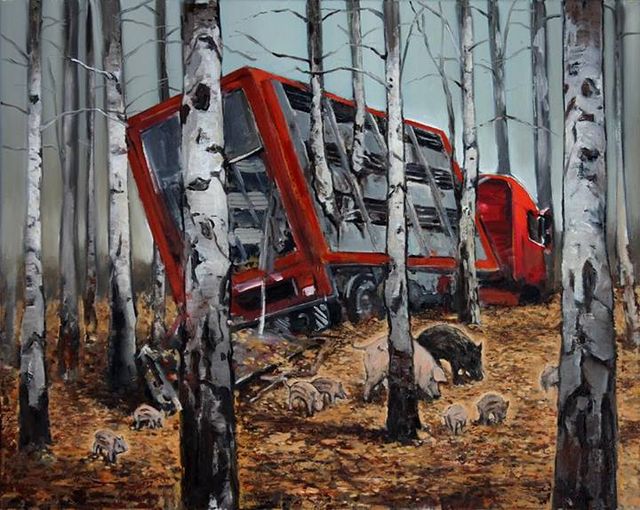Essential Questions on Ecology & Decolonization

Shared from https://hastenthedownfall.wordpress.com/2015/03/12/essential-questions-on-ecology-decolonization/
Personal Questions, Part I
Where does your water come from? Where does your food come from? Who makes the things you use? Under what conditions? Where does your poop go when you dispose of it? Where do your other wastes end up? Who lives within 200 feet of you when you sleep? How well do you know them? Do you interact more with creatures, or plastic?
Where does your water come from? Where does your food come from? Who makes the things you use? Under what conditions? Where does your poop go when you dispose of it? Where do your other wastes end up? Who lives within 200 feet of you when you sleep? How well do you know them? Do you interact more with creatures, or plastic?
Ecology Questions, Part I
Does the moon currently wax or wane? What wild flora, fauna, and fungi live around you? Which local native species do you know? What watershed do you live in? Which ones border it? What do you know about your local bioregion? Polar, temperate, or tropical climate? Do you know your latitude, humidity, and elevation? Your hardiness zone? The direction and source of your winds and rains? What terrestrial biomes predominate locally? This can include tropical rainforest, tropical savanna, desert, chaparral, grassland, temperate deciduous forest, temperate boreal forest, arctic and alpine tundra. What terrestrial and freshwater ecoregion types do you live within?
Does the moon currently wax or wane? What wild flora, fauna, and fungi live around you? Which local native species do you know? What watershed do you live in? Which ones border it? What do you know about your local bioregion? Polar, temperate, or tropical climate? Do you know your latitude, humidity, and elevation? Your hardiness zone? The direction and source of your winds and rains? What terrestrial biomes predominate locally? This can include tropical rainforest, tropical savanna, desert, chaparral, grassland, temperate deciduous forest, temperate boreal forest, arctic and alpine tundra. What terrestrial and freshwater ecoregion types do you live within?
Indigenous Questions
Which various indigenous peoples inhabit(ed) your region? What do you know of their subsistence methods (e.g. scavenging, hunting, trapping, fishing, gathering, collecting, horticulture, herding, husbandry, intensive agriculture, raiding)? What significance do or did specific species of local flora, fauna, and fungi hold for the natives? What do you know of their settlement patterns (i.e. nomadic, semi-nomadic, sedentary)? What do you know of their social organization (i.e. bands, tribes, chiefdoms, States)? Consider how different native cultures related to one another as well. What do you know of colonization history, and the current conditions or fate of local indigenous peoples?
Which various indigenous peoples inhabit(ed) your region? What do you know of their subsistence methods (e.g. scavenging, hunting, trapping, fishing, gathering, collecting, horticulture, herding, husbandry, intensive agriculture, raiding)? What significance do or did specific species of local flora, fauna, and fungi hold for the natives? What do you know of their settlement patterns (i.e. nomadic, semi-nomadic, sedentary)? What do you know of their social organization (i.e. bands, tribes, chiefdoms, States)? Consider how different native cultures related to one another as well. What do you know of colonization history, and the current conditions or fate of local indigenous peoples?
Ecology Questions, Part II
What did your landbase (wildlife, watershed, biomes, bioregion) look like across various geological phases, before modification by agrarian, pastoral, urban, and industrial cultures? How have agrarian, pastoral, urban, and industrial cultures affected your landbase? Which ecological issues does your landbase face? This could include such issues as habitat destruction, disruption, and volatility; keystone species die offs; mass species die offs; pollution & toxification; drawdown & overshoot.
What did your landbase (wildlife, watershed, biomes, bioregion) look like across various geological phases, before modification by agrarian, pastoral, urban, and industrial cultures? How have agrarian, pastoral, urban, and industrial cultures affected your landbase? Which ecological issues does your landbase face? This could include such issues as habitat destruction, disruption, and volatility; keystone species die offs; mass species die offs; pollution & toxification; drawdown & overshoot.
Personal Questions, Part II
How did your ancestors define and practice their ethnicity and spirituality? Look as far back as you can, tracing each change you can locate. What values do you hold, and how do you live them out? What provides obstacles and opportunities? How does all this relate back to your landbase: do your values foster regenerative, sustainable, or extractive relations? How about your behaviors? What dies so that you may live? How do you give back?
How did your ancestors define and practice their ethnicity and spirituality? Look as far back as you can, tracing each change you can locate. What values do you hold, and how do you live them out? What provides obstacles and opportunities? How does all this relate back to your landbase: do your values foster regenerative, sustainable, or extractive relations? How about your behaviors? What dies so that you may live? How do you give back?
[1] 14 Major Terrestrial Ecoregion Types:
1. Tropical & subtropical moist broadleaf forests (tropical & subtropical, humid)
2. Tropical & subtropical dry broadleaf forests (tropical & subtropical, semihumid)
3. Tropical & subtropical coniferous forests (tropical & subtropical, semihumid)
4. Temperate broadleaf & mixed forests (temperate, humid)
5. Temperate coniferous forests (temperate, humid to semihumid)
6. Boreal forests/taiga (subarctic, humid)
7. Tropical & subtropical grasslands, savannas, & shrublands (tropical & subtropical, semiarid)
8. Temperate grasslands, savannas, & shrublands (temperate, semiarid)
9. Flooded grasslands & savannas (temperate to tropical, fresh or brackish water inundated)
10. Montane grasslands & shrublands (alpine or montane climate)
11. Tundra (Arctic)
12. Mediterranean forests, woodlands, & scrub or sclerophyll forests (temperate warm, semihumid to semiarid with winter rainfall)
13. Deserts & xeric shrublands (temperate to tropical, arid)
14. Mangrove (subtropical & tropical, salt water inundated)
1. Tropical & subtropical moist broadleaf forests (tropical & subtropical, humid)
2. Tropical & subtropical dry broadleaf forests (tropical & subtropical, semihumid)
3. Tropical & subtropical coniferous forests (tropical & subtropical, semihumid)
4. Temperate broadleaf & mixed forests (temperate, humid)
5. Temperate coniferous forests (temperate, humid to semihumid)
6. Boreal forests/taiga (subarctic, humid)
7. Tropical & subtropical grasslands, savannas, & shrublands (tropical & subtropical, semiarid)
8. Temperate grasslands, savannas, & shrublands (temperate, semiarid)
9. Flooded grasslands & savannas (temperate to tropical, fresh or brackish water inundated)
10. Montane grasslands & shrublands (alpine or montane climate)
11. Tundra (Arctic)
12. Mediterranean forests, woodlands, & scrub or sclerophyll forests (temperate warm, semihumid to semiarid with winter rainfall)
13. Deserts & xeric shrublands (temperate to tropical, arid)
14. Mangrove (subtropical & tropical, salt water inundated)
[2] 12 Major Freshwater Ecoregion Types:
1. Large lakes
2. Large river deltas
3. Polar freshwaters
4. Montane freshwaters
5. Temperate coastal rivers
6. Temperate floodplain rivers & wetlands
7. Temperate upland rivers
8. Tropical & subtropical coastal rivers
9. Tropical & subtropical floodplain rivers & wetlands
10. Tropical & subtropical upland rivers
11. Xeric freshwaters & endorheic basins
12. Oceanic islands
1. Large lakes
2. Large river deltas
3. Polar freshwaters
4. Montane freshwaters
5. Temperate coastal rivers
6. Temperate floodplain rivers & wetlands
7. Temperate upland rivers
8. Tropical & subtropical coastal rivers
9. Tropical & subtropical floodplain rivers & wetlands
10. Tropical & subtropical upland rivers
11. Xeric freshwaters & endorheic basins
12. Oceanic islands


